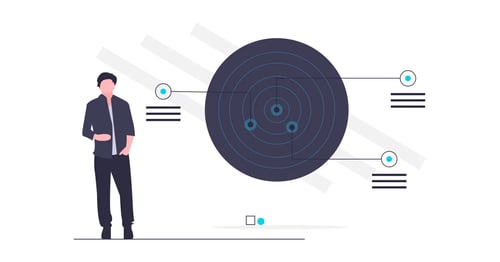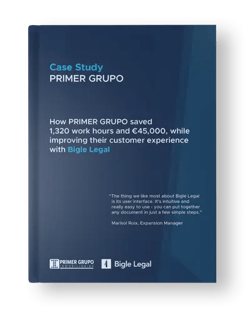5 Companies That Mastered Legal Technology (2019 Success Cases)

Every legal team knows embracing innovation can be a game-changer. But to what end? How can legal technology tools actually help you save time, provide better service, and make an impact on their bottom-line?
Well, sit back and relax - that’s exactly what this article will explore. We’ve curated a handful of case studies to demonstrate how global companies and firms have used legal innovation to propel themselves forward!
PRIMER GRUPO + document automation
PRIMER GRUPO is a Spanish-based real estate franchise, offering professional services such as the purchase and sale of property, property management, property valuation, real estate marketing, as well as legal advice and assessment.
As the company grew larger, so did the amount of paperwork they were tasked with. That’s why, they wanted to find a way to streamline the contract process, draft error-free legal documents quickly, update the contracts when laws changed, and better collaborate as a team.
To achieve this, PRIMER GRUPO leveraged the document automation platform by Bigle Legal. And as the case study explains, our platform enabled PRIMER GRUPO to automate their contract creation, collaborate online and offline, analyze and track progress, leverage digital signatures and easily integrate with their CRM.
"The result? Leveraging the Bigle Legal document automation product is able to save PRIMER GRUPO 1320 hours - that’s 33 weeks - and €45,000 each year".
L’Oréal + automation and contract lifecycle management

The legal team at L’Oréal Australia and New Zealand wanted to help the business move forward. But they found it difficult due to the amount of day-to-day work they were tasked with - after all, L’Oréal works with 45 brands combined in both countries.
The legal team began to leverage Plexus to free up more time - a legal automation tool that offers end-to-end contract lifecycle management, automated workflows, and self-service apps, among other things.
The case study states that Plexus’ legal innovation tool has helped the L’Oréal business team in Australia and New Zealand to ‘self-serve’ on daily legal tasks - but consult a human lawyer when things are a bit more complicated.
This has enabled the legal team to focus on providing more value rather than focusing on more mundane tasks. And when it comes to generating agreements - such as influencer agreements, for example - Plexus has saved L’Oréal hours of time.
While the average agreement once took four hours to be generated, states the case study, it now only takes L’Oréal 18 minutes.
Fredrikson Law + contract review

Fredrikson Law is a firm based in Minneapolis, which has offices across the U.S., as well as in Mexico and China. The firm regularly leverages a machine learning software called Kira to extract and analyze key provisions in contracts in need of review.
When Fredrikson Law was asked by a client to complete an M&A due diligence review on 500+ documents, three associates and one paralegal at Fredrikson Law used Kira to complete the review early, in just three days instead of five. This resulted in a time savings of 48%.
The firm also estimated that Kira’s legal technology tool helped increase to efficiency by 22%.
“The use of Kira allowed us to more efficiently review and pull key information from a voluminous set of documents for a time-sensitive issue. In addition, throughout the matter, Kira’s features assisted with the general organisation and identification of key contracts and terms,” said one stakeholder at the firm in the case study.
Salazar Law + legal research

Salazar Law is a firm located just outside of Miami. Its practice areas include reorganization and bankruptcy, corporate and transactions, data privacy and new media, and trial and litigation.
The firm opened as an alternative to Big Law and its business model relies on staying small and agile to serve clients faster and better—something that legal technology has helped it to achieve.
Salazar Law leverages ROSS, a popular AI-based legal research product that curates relevant law passages for lawyers tasked with developing arguments for a case.
“ROSS helps Salazar Law respond to opposing counsel faster, and cuts down the time it takes to get the precise answers they need to win cases,” writes the case study.
But more, leveraging the legal research tool means the firm doesn’t need to hire a research team - which of course, leads to a higher ROI all around.
Tees Law + Speech Recognition

Tees Law is a large UK-based firm with more than 100 years of experience. The firm wanted to better streamline its document production.
When papers were being submitted to the central production team, documents like attendance notes would end up at the bottom of the pile, explained the firm’s Group Managing Director - making it difficult for lawyers to remember meetings that happened days prior.
Thus, Tees Law adopted a speech recognition tool by BigHand, which enabled the lawyers to record their thoughts in the moment and dictate this speech to text.
The legal innovation tool has enabled Tee Law to cut dictation time by 33%, compared to the dictation software they’d used before, which was sent to normal transcription.
The case study states that it also helped the document production team to better manage its workflows and focus on more complex legal documents. In fact, turnaround time has been cut in half.
How can legal technology help you?

Through exploring how companies and firms around the world have leveraged different legal tools - including document automation, legal research, speech recognition, contract review and contract lifecycle management products - the impact of legal innovation is clear.
By embracing technology, legal teams have the opportunity to increase efficiency, improve their workflows, save time, raise the ROI - and most importantly, serve clients better. Now, what’s not to love?
 By
By




